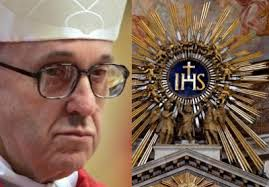 The recently concluded visit of Pope Francis to the United States has put me in a Jesuit frame of mind. The Jesuits are the first Catholics I ever spent extended time with, and they ruined me for the rest of them. I have spent the past twenty-seven years of my life, first as a student then as a professor, in Catholic higher education—and it all started with the Jesuits.
The recently concluded visit of Pope Francis to the United States has put me in a Jesuit frame of mind. The Jesuits are the first Catholics I ever spent extended time with, and they ruined me for the rest of them. I have spent the past twenty-seven years of my life, first as a student then as a professor, in Catholic higher education—and it all started with the Jesuits.
So how did an Episcopalian with deep roots in hard-core conservative Protestantism end up earning his PhD at Jesuit-run Marquette University in Milwaukee, WI? Because with my philosophy MA in hand, I wanted (against the strong advice of the professors in my analytic MA program) to do my terminal degree at a place known for its excellence in the history of philosophy. I applied to four, was accepted at three, and Marquette offered me the best financial deal. So Jeanne and I (we had met just eight months earlier) arrived with my two sons in tow for fun and games in Milwaukee in August of 1988. 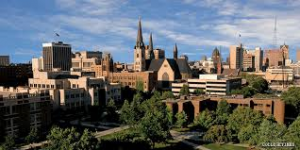 I swear that its being a Catholic, Jesuit university had exactly zero influence on our choice of Marquette.
I swear that its being a Catholic, Jesuit university had exactly zero influence on our choice of Marquette.
During my years at Marquette there were significantly more lay professors than Jesuits on the philosophy faculty, but since at the time the philosophy department was the largest in the United States (I don’t think it is any more), there were plenty of Jesuits. Father Treloar, the head of the department’s graduate program, quickly became one of my two most influential mentors and over the months a strong friendship developed. Father Teske, an internationally renowned Augustine scholar, had a quiet intensity and power beneath his favorite uncle sort of exterior and persona. Father Naus, who among other things taught courses in the philosophy of humor, proved his bona fides by displaying a certificate from clown school on his wall.

Each of the half dozen or so priests I came to know impressed me as committed to their vocation, but equally (if not more) committed to the life of the mind and excellence in teaching and scholarship. I learned over time that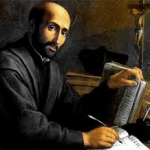 Ignatius of Loyola, the founder of the Jesuit order, envisioned a different kind of monastic order, monks who did not have cells in a monastery but whose cell is to be where they are—in the classroom, in a laboratory, at a nursing home helping people. A Jesuit’s cell is to be where he is working. The Jesuits in the philosophy department lived this charism to the fullest.
Ignatius of Loyola, the founder of the Jesuit order, envisioned a different kind of monastic order, monks who did not have cells in a monastery but whose cell is to be where they are—in the classroom, in a laboratory, at a nursing home helping people. A Jesuit’s cell is to be where he is working. The Jesuits in the philosophy department lived this charism to the fullest.
Because I was five years or so older than the other new PhD candidates, I was able to avoid being placed in the large room with cubicles for the multitude of graduate students. Instead, for the three years I was at Marquette I was placed in the unoccupied office of a professor on sabbatical, a different one each year.  One year I was directly across the hall from Dr. McNulty, a professor I never had in class because his area—contemporary political philosophy—was significantly different than my developing focus on early modern philosophy and ethics. He was an introvert, so am I, so during the year I was his across the hall neighbor we did a lot of nodding to each other and “good mornings” as we entered and exited our offices, and not much more.
One year I was directly across the hall from Dr. McNulty, a professor I never had in class because his area—contemporary political philosophy—was significantly different than my developing focus on early modern philosophy and ethics. He was an introvert, so am I, so during the year I was his across the hall neighbor we did a lot of nodding to each other and “good mornings” as we entered and exited our offices, and not much more.
During my last semester at Marquette—I had successfully defended my dissertation and was simply waiting for May to receive my diploma at commencement—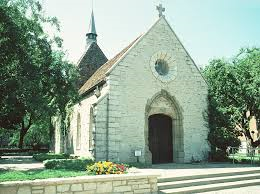 I wandered one late afternoon into my favorite place on campus, beautiful little stone St. Joan of Arc Chapel. This tiny chapel built in 15th century France was gifted to Marquette by way of Long Island in the 1960s (it’s a crazy story—you can look it up); a particular stone in the floor at the front of the chapel was supposedly stood upon by Joan of Arc as she prayed before going into battle. The stone reportedly is always cooler than the stones surrounding it, I guess because Joan was cooler than everyone else. I never could detect a temperature difference.
I wandered one late afternoon into my favorite place on campus, beautiful little stone St. Joan of Arc Chapel. This tiny chapel built in 15th century France was gifted to Marquette by way of Long Island in the 1960s (it’s a crazy story—you can look it up); a particular stone in the floor at the front of the chapel was supposedly stood upon by Joan of Arc as she prayed before going into battle. The stone reportedly is always cooler than the stones surrounding it, I guess because Joan was cooler than everyone else. I never could detect a temperature difference.
A daily mass attended by a few students was in progress as I poked my head in the door, and I had a classic WTF moment. “Holy shit, that’s McNulty celebrating the mass up front! McNulty’s a priest???” And he certainly appeared to be, wearing priestly stuff and acting in priestly ways—but this was news to me. I had seen this guy once or twice a day every weekday for an academic year, and he had been on my radar screen for my two and a half years at Marquette. He never wore a collar, he never acted like a priest (my Protestantism is showing), preferring the baggy sweaters and threadbare trousers that most male academics love to wear. Suffice it to say that Jesuits, at least many of those I spent three years with, do not wear their ordination on their sleeve in the way that the members of the other three Catholic orders 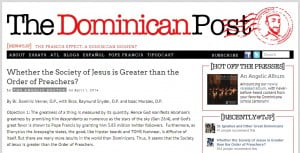 I have taught and hung out with in the years since do. I like that.
I have taught and hung out with in the years since do. I like that.
I’ve learned a number of additional things about the Jesuits over the years since leaving Marquette in 1991, including that there is an intense rivalry bordering on serious dislike between the Jesuits and the Dominican Order—it’s an in-house family issue that non-Catholic outsiders such as I don’t entirely get. The Dominican Fathers run the college at which I have taught happily and successfully for the past twenty-one years; I learned early on never to talk about my bromance with the Jesuits within earshot of a Dominican. Once my first or second year into my current position, I was having a conversation in the philosophy department hall with a handful of colleagues, including a young Dominican priest. I mentioned tongue-in-cheek that I had the impression that for the uber-Catholics, including the Dominicans, on campus my being Protestant was far less of a problem than my having been educated by the Jesuits (ha, ha, ha). Without missing a beat, my Dominican colleague said “You’re right.” He wasn’t kidding.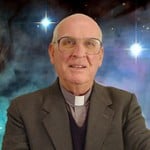
I recently heard an interview with Father George Coyne, the recently retired head of the Vatican Observatory, in which he tells a story that for me perfectly captures why I love Jesuits.
I gave a paper at a scientific meeting on the uncertainties in our determination of the age of the universe. There’s several methods we use for determining the age of the universe and a degree of uncertainty is involved with each of them. Well, whenever I’m at a scientific conference, I’m not dressed as a priest because it just — why? You know, it just confuses things.
But I had just given a talk in a church or something, so I gave this talk and I was wearing my Roman collar. So a gentleman stood up — the discussion period, question period, and the first thing he said was “Father.” And I trembled at the thought that he had, first of all, called me Father, but then he proceeded to build upon that and he said, 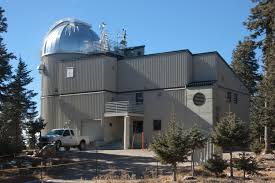 “Father, it must be wonderful that, you know, with all the uncertainties we have in our scientific pursuits that you have this faith, this rock of faith to stand upon.” So what I did is I took off my Roman collar and faced him down and said, “Who told you that my faith was kind of a rock?” I said, “Every morning I wake up I have my doubts. I have my uncertainties. I have to struggle to help my faith grow.” Because faith is love. Love in marriage, love with friends, love of brothers and sisters, is not something that’s there once and for all and always kind of a rock that gives us support.
“Father, it must be wonderful that, you know, with all the uncertainties we have in our scientific pursuits that you have this faith, this rock of faith to stand upon.” So what I did is I took off my Roman collar and faced him down and said, “Who told you that my faith was kind of a rock?” I said, “Every morning I wake up I have my doubts. I have my uncertainties. I have to struggle to help my faith grow.” Because faith is love. Love in marriage, love with friends, love of brothers and sisters, is not something that’s there once and for all and always kind of a rock that gives us support.
On Being: Asteroids, Stars, and the Love of God
Amen, Father George. In a different world, a parallel universe, in which rather than meeting my first Catholic when I was in my twenties I was instead raised Catholic, I have no doubt the Jesuits would have gotten me. Big time.











